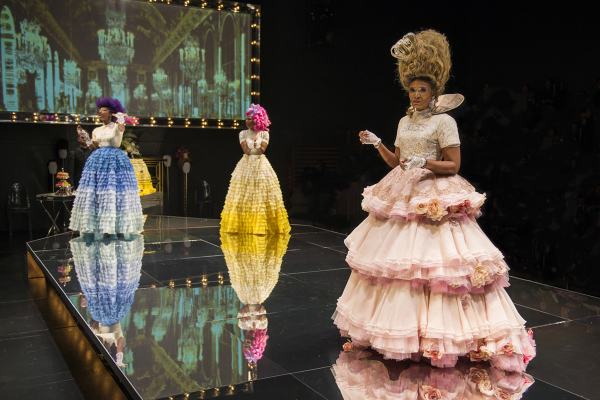
(© Michael Brosilow)
The first thing that hits you about David Adjmi's tragicomic Marie Antoinette is the jaw-dropping couture on display. Costume designer Dede Ayite has the women of Steppenwolf's cast decked out in confections so elaborate that Rihanna's latest Grammy gown looks like a flour sack shift in comparison. But the dazzle factor of elaborately voluminous frocks veritably dripping with pink roses and endless layered flounces is far from the only thing that commands the attention.
Directed by Robert O'Hara and running through May 10 at Steppenwolf's intimate Upstairs Theatre, Marie Antoinette is a bold take on the infamously extravagant 18th-century queen whose severed head plunked into a basket after meeting the guillotine in 1793.
The events that unfold as Marie (Alana Arenas) and the hapless King Louis (Tim Hopper) obliviously march ever closer to execution may have taken place over 220 years ago, but Marie Antoinette pops with a contemporary vernacular that somehow manages to be as current as the latest texting acronyms that play a whimsical part in that costume design without sacrificing historic context. The result is an intriguing, quasi-period piece that captures the timeless trap of thoughtless materialism while basking (and screeching and weeping) in the era and unrest that led to the bloody end of the French monarchy.
Adjmi clearly did his research. Many of the scandals and gross missteps that punctuated Marie's fall from beloved "Butterfly Queen" to despised symbol of heedless greed are on display here, filtered through the eyes of a queen seemingly incapable of understanding that her subjects are starving. King Louis' impotence, the 1789 Tennis Court Oath by anti-Royalists demanding a constitution, the storming of the Bastille, the Affaire of the Diamond Necklace (wherein Marie was accused of not paying the crown jewelers for a budget-busting necklace), and even the detail that her much-copied hairdos were so towering that carriage roofs had to be raised – Adjmi weaves them all into the story. He also provides the rich context of what historians know and surmise about the last Queen of France's personality. Marie was a poorly educated, essentially illiterate Austrian who was married and shipped off to France at 14, groomed to be nothing more than a gilded, empty bauble on the arm of a powerful husband.
In the title role, Arenas captures the essence of a thoughtless woman who has been trained to be just that, creating a character that is exasperating, insufferable, charismatic, and almost shockingly easy to empathize with. Marie is aware of her shortcomings, but never able to grasp the importance of their impact on the French majority.
"Human relations, so confusing. These rumors, it hurts my head," she puzzles in an accent somewhere between Valley Girl and Lincoln Park Trixie. In addition to such fatally self-absorbed nonchalance, Arenas gives us a woman who feels as trapped as a pinned butterfly. "They should just press me against glass slides," Marie laments. As her equally ill-informed spouse, Hopper is marvelously dithering, a lovable hapless fellow forced into a marriage and a job he never wanted. Cranky, petulant, and whiny, Louis XVI should have been a simple clockmaker. He's happiest when fiddling with springs and latches, and loath to make anything resembling a major decision.
Hopper and Arenas are surrounded by a strong supporting cast that features Alan Wilder as a sheep of uncommon wisdom (and attire) and Ariel Shafir as Axel de Fersen, the tall, impossibly sensuous Swedish count who is the only one in Marie's small circle who treats her like a person rather than a decorative ornament. There's also gut-wrenching work by Matthew Abraham as Marie's young son and France's heir apparent.
The production's lavish story and costumes are juxtaposed with set designer Clint Ramos' sleek, minimalist environment, which is augmented by Jeff Sugg's luscious projections and Japhy Weideman's dramatic lighting design. From Versailles' glittering chandeliers and sumptuous gardens to the damp, dark prison where the royal family spends its final days, Marie Antoinette is awash in immersive visuals and reminders that things aren't always what they seem.
The infamous "let them eat cake" line is in there too, but like the title character, the context isn't quite what you're expecting. As for those costumes, Ayite shifts from pink to black roses by the end. Oblivious to the last, the Queen still can't quite see the darkness. She's smiling at all the pretty fireworks as she's marched off to her death.








